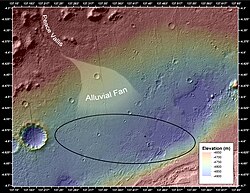皮斯谷
外观
 | |
| 坐标 | 4°13′S 137°14′E / 4.21°S 137.23°E |
|---|---|
| 长度 | 35.24公里(21.9英里) |
| 名称 | 2012年9月26日,国际天文联合会取自“加拿大阿尔伯塔省和英属哥伦比亚的一条河流”名[1]。 |
皮斯谷(Peace Vallis)是火星埃俄利斯区盖尔撞击坑中一道似乎由流体,也许是水流蚀刻而成的河谷[2][3][4]。该河谷从盖尔撞击坑的山丘向东南“流入”到夏普山下附近的埃俄利斯沼,它的中心坐标为4°13′S 137°14′E / 4.21°S 137.23°E[1]。皮斯谷靠近“好奇号”漫游车着陆点附近(布雷德伯里着陆场),漫游车于2012年开始研究该河谷。2012年9月26日国际天文联合会正式采纳了“皮斯谷”这一名称[1]。
“好奇号”漫游车降落在皮斯谷冲积扇末端附近,皮斯谷冲积扇覆盖了80公里2(31英里2)的区域,水源范围达到730公里2(280英里2),皮斯谷通过盖尔撞击坑坑壁上一处15公里(9.3英里)宽的豁口进入坑内。计算表明,该冲积扇平均厚度为 9 米(30英尺),在冲积扇西部表面可看到许多倒转河道,流经皮斯谷形成冲积扇的径流估计宽达600 到6000米(0.37至3.73英里)之间。因此,这一水循环系统可能至少持续了数千年,在皮斯谷中流动的水流被认为可能来自融雪[5][6]。
图集
[编辑]另请查看
[编辑]参考文献
[编辑]- ^ 1.0 1.1 1.2 IAU Staff. Gazetteer of Planetary Nomenclature: Peace Vallis. IAU. September 26, 2012 [September 28, 2012]. (原始内容存档于2018-06-29).
- ^ 2.0 2.1 Brown, Dwayne; Cole, Steve; Webster, Guy; Agle, D.C. NASA Rover Finds Old Streambed On Martian Surface. NASA. September 27, 2012 [September 28, 2012]. (原始内容存档于2020-05-13).
- ^ 3.0 3.1 NASA. NASA's Curiosity Rover Finds Old Streambed on Mars - video (51:40). NASAtelevision. September 27, 2012 [September 28, 2012]. (原始内容存档于2018-09-27).
- ^ 4.0 4.1 Chang, Alicia. Mars rover Curiosity finds signs of ancient stream. AP News. September 27, 2012 [September 27, 2012]. (原始内容存档于2013-05-16).
- ^ Palucis, Marisa C. The origin and evolution of the Peace Vallis fan system that drains to theCuriositylanding area, Gale Crater, Mars. Journal of Geophysical Research: Planets: 705–728. Bibcode:2014JGRE..119..705P. doi:10.1002/2013JE004583.
- ^ Palucis, M.; Dietrich, W.; Hayes, A.; Williams, R.; Gupta, S.; Mangold, N.; Newsom, H.; Hardgrove, C.; Calef, III; Sumne, D. The origin and evolution of the Peace Vallis fan system that drains to the Curiosity landing area, Gale Crater, Mars. Journal of Geophysical Research: Planets. 2014, 119: 705–728. Bibcode:2014JGRE..119..705P. doi:10.1002/2013je004583.
外部链接
[编辑]- 谷歌火星滚动地图 (页面存档备份,存于互联网档案馆)—以皮斯谷为中心。
- 视频(04:32) - 证据:火星上“奔涌”流动的水流—2012年9月 (页面存档备份,存于互联网档案馆)
- 视频(66:00)湖泊、冲积扇、三角洲和溪流:限定的地貌—2015年5月 (页面存档备份,存于互联网档案馆)












